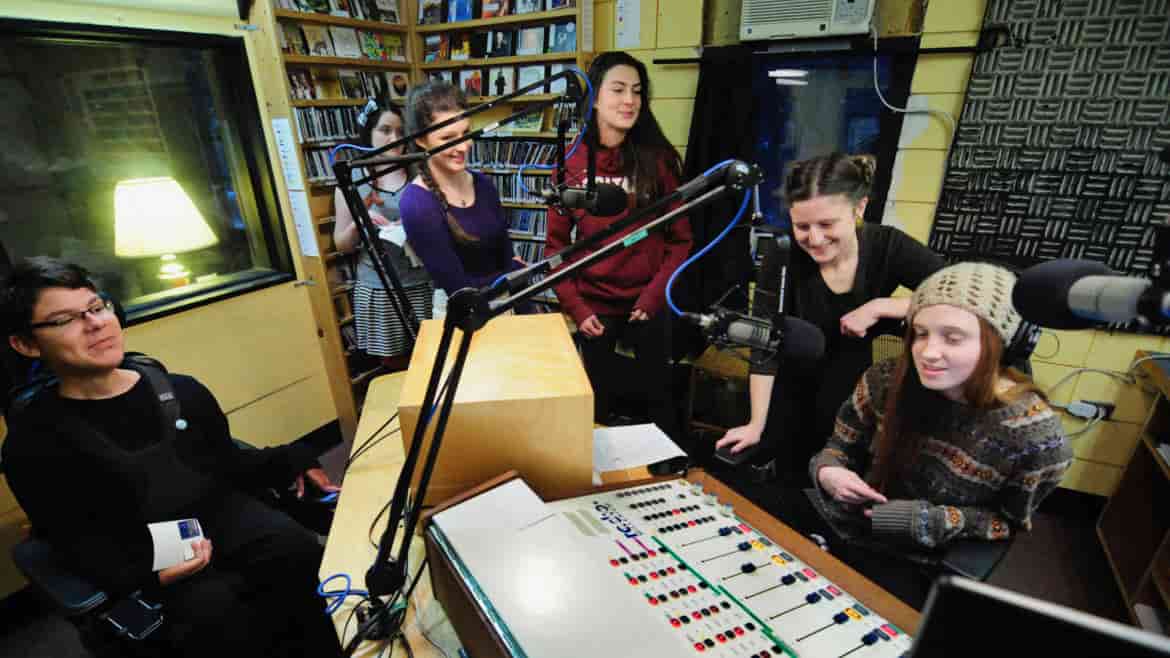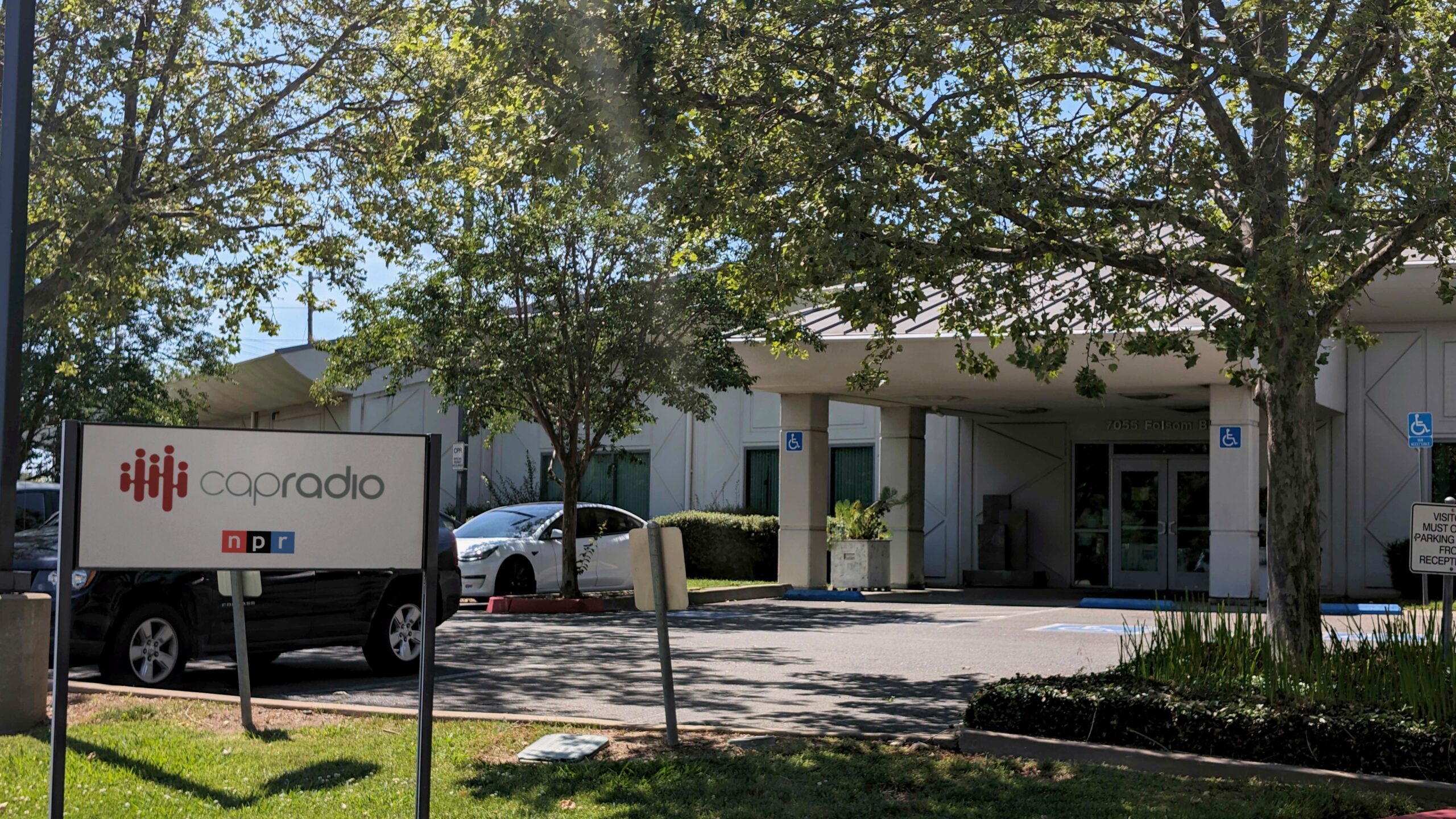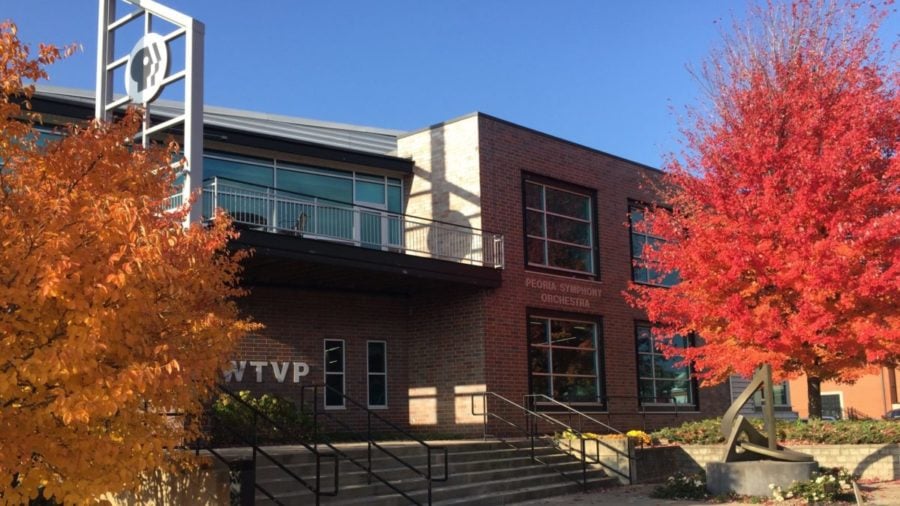Rare donation of license awards freedom to Vermont community station

WGDR/WGDH
A WGDR/WGDH staffer works with high-school students in the studio as part of Indie Kingdom, a youth journalism program the station created and ran from 2015 to 2017.
Goddard College in Plainfield, Vt., has granted independence to community radio station WGDR/WGDH by donating its license to a new nonprofit.
The station received final FCC approval May 31 to transfer operations to Central Vermont Community Radio. The transition marks a win for community broadcasting as many colleges around the nation have sold licenses or merged their stations with others.
Such an outcome is “extremely rare,” said Ernesto Aguilar, executive director of the National Federation of Community Broadcasters.
“For Goddard College to say, ‘This voice in this community, this outpost, this little beacon out in rural Vermont is something that we want to preserve,’ when I’m sure somebody would’ve offered them money for it, is meaningful, because it doesn’t happen all the time,” Aguilar said.
Goddard established WGDR in the mid-1960s and received an FCC license for the station in 1973. For decades, WGDR functioned not as a community radio station but as a college station mostly involving students and faculty. That changed when Goddard eliminated its residential program in 2002 in favor of a nontraditional model that brings students to campus for just eight days each semester.
“There’s not a student body on campus any longer, so the college really lost its reason for having a radio station,” said Joseph Gainza, a station host and one of four CVCR board members.
When students left, community members stepped in to create programming and make sure WGDR/WGDH survived. The station now airs local news and storytelling, a variety of music, Democracy Now! and syndicated Pacifica shows. It rents studio space from Goddard, though hosts are still recording most shows at home due to COVID.
In 2005, Goddard hired a full-time manager to coordinate the volunteer programmers, and WGDR/WGDH received its first CPB Community Service Grant. Sister station WGDH signed on in 2011.
Goddard’s administration began reconsidering the station’s future in September 2020 when WGDR/WGDH fell short of minimum fundraising requirements and lost its CSG, according to Kris Gruen, who led the station for a decade under Goddard’s control. Community members and longtime programmers had urged Gruen to consider the station’s future beyond Goddard right away when he started as director in 2010.
“I had been asking the leadership of the college for a couple of years to start the process of getting ready to let go of the radio station in this gifting capacity,” said Gruen, who is now volunteering with CVCR to assist the station through the transition.
‘Angels descending’
The college also considered giving the station’s license to Vermont Public Radio. Gruen said he was happy to find that both VPR CEO Scott Finn and Goddard President Bernard Bull were determined to make sure that WGDR/WGDH remained a community station.
“Our experience is that the community is very supportive of radio in Vermont,” Finn said. “We just shared our desire to help WGDR do whatever it thought was best for its future. And Kris went to the community, and they had a conversation, and they thought that they could do it and now they’ve done it, which is wonderful.”
WGDR/WGDH needed to raise $50,000 to create CVCR and transfer the license, twice the earnings from a typical fund drive, Gruen said. Over less than two months, community members surpassed the goal, eventually contributing $55,000.
Goddard and the newly formed CVCR were then able to apply to the FCC and begin legal negotiations. CVCR’s lawyer donated pro bono services to help the fledgling organization navigate the complicated process.
“This is where we start to see angels descending, right?” Gruen said. “People came to the table with their time and effort and money because they saw the genuine, true nature of the gifting happening.”
The FCC gave its initial stamp of approval in April, earlier than expected. Gruen said that if the approval had come later, WGDR/WGDH would have temporarily gone off the air because Goddard could not afford to continue financing the station after the funds raised for the transition period ran out.
National organizations also got involved to help make the deal happen, Gruen said, with Pacifica offering a discount on membership fees and NFCB CEO Sally Kane consulting with President Bull throughout the process.
About a dozen volunteers keep WGDR/WDGH running. CVCR hopes to be able to fund a paid position someday, but its board “is taking on the station management function for the near future,” Gainza said.
The nonprofit began its first fundraising campaign in mid-May, seeking to raise $30,000 in 30 days to pay for six months’ worth of “utilities, subscriptions, rent, and administrative costs,” according to the organization’s website.








